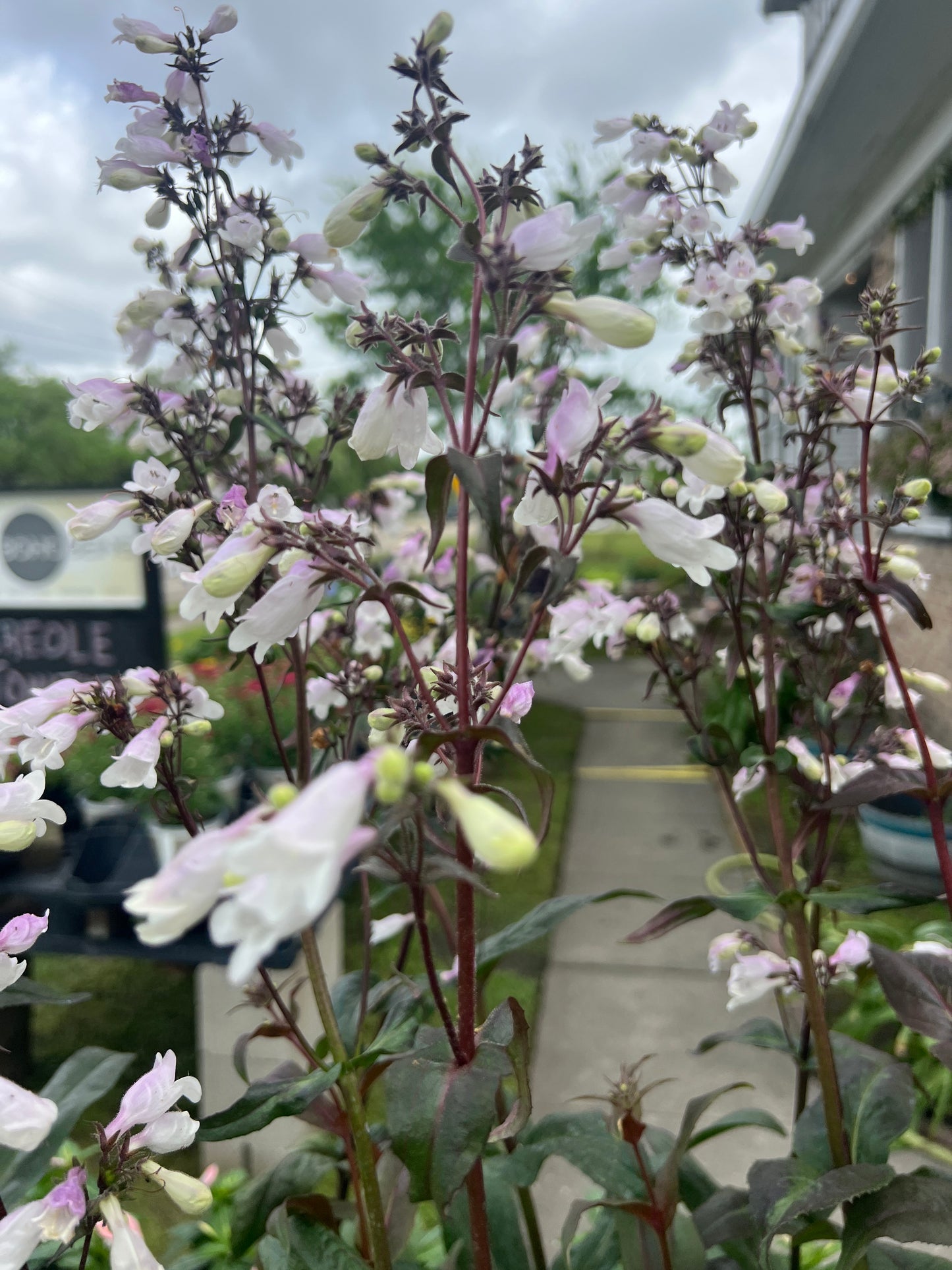Beardtongue "Blackbeard" Penstemon
Beardtongue "Blackbeard" Penstemon
Beardtongue "Blackbeard" (Penstemon 'Blackbeard') is a striking perennial known for its deep purple, almost black foliage and tall spikes of tubular flowers. The flowers are a rich lavender-purple, blooming in late spring to early summer. This cultivar is prized for its dramatic color contrast, with the dark foliage providing a beautiful backdrop to the vibrant flowers. "Blackbeard" is a hardy and low-maintenance plant that is drought-tolerant once established, making it an excellent choice for sunny garden beds and borders.
Plant Characteristics:
- Flower Color: Lavender-purple
- Foliage: Dark purple, almost black leaves
- Growth Habit: Upright, clump-forming perennial
Native Range:
Penstemon species are native to North America, particularly the western United States. "Blackbeard" is a cultivar developed for ornamental use, with enhanced color characteristics compared to its wild relatives.
USDA Hardiness Zones:
- Best suited for zones 3-9. It is hardy and can tolerate cold winters in these zones, making it a versatile choice for many climates.
Height and Width:
- Height: 28-36 inches (70-90 cm)
- Width: 18-24 inches (45-60 cm)
Light Requirements:
- Prefers full sun to partial shade. It thrives in full sun (6-8 hours of direct sunlight daily), which promotes the best foliage color and flower production. However, in hotter climates, some afternoon shade can help prevent leaf scorching.
Soil Requirements:
- Grows best in well-draining soil with a slightly acidic to neutral pH (6.0-7.5). It can tolerate poor, rocky, or sandy soils, making it a good choice for difficult sites where other plants may struggle.
- Good drainage is essential to prevent root rot, especially in areas with heavy clay soils or during wet seasons.
Watering:
- Requires moderate watering, especially during the first growing season to help establish a deep root system. Once established, "Blackbeard" is drought-tolerant and only needs occasional watering during prolonged dry spells.
- Avoid overwatering, as Penstemon species prefer drier conditions and are susceptible to root rot in consistently wet soils.
Temperature and Humidity:
- Prefers cooler to moderate temperatures and can tolerate cold winters in its hardiness zones. It is not suited for very hot, humid climates, where it may struggle with heat stress and fungal diseases.
- Thrives in areas with low to moderate humidity and is well-suited for arid and semi-arid regions.
Fertilization:
- Generally does not require heavy fertilization. A light application of a balanced, slow-release fertilizer in early spring can help promote healthy growth and flowering.
- Over-fertilizing can lead to excessive foliage growth at the expense of blooms, so use fertilizers sparingly.
Pruning and Maintenance:
- Deadhead spent flowers to encourage continuous blooming and maintain a tidy appearance. Removing faded flower spikes can also prevent the plant from self-seeding excessively.
- In late fall, cut back the foliage to the ground to prepare for winter. This helps protect the plant from winter damage and promotes fresh growth in the spring.
- Divide the plant every 3-4 years in early spring to maintain vigor and prevent overcrowding.
Uses
- Ornamental Gardens: Ideal for adding color and contrast to garden beds, borders, and mixed perennial plantings. Its tall flower spikes and dark foliage make it an attractive focal point in sunny locations.
- Pollinator Gardens: Attracts bees, butterflies, and hummingbirds, making it a valuable addition to pollinator-friendly gardens. The tubular flowers are particularly appealing to hummingbirds and long-tongued bees.
- Drought-Tolerant Landscapes: Well-suited for xeriscaping and water-wise gardens, where its drought tolerance and low water needs make it a practical choice.
- Rock Gardens: Performs well in rock gardens and gravelly soils, where its preference for well-drained conditions can be easily met.
- Cut Flowers: The tall flower spikes of "Blackbeard" make excellent cut flowers for fresh arrangements, adding height and color to floral displays.
By providing the right growing conditions and care, Beardtongue "Blackbeard" can thrive and add a dramatic and colorful presence to any garden or landscape, enhancing both visual appeal and ecological value.
---SHIPPING NOTICE PLEASE READ BEFORE PURCHASING LIVE PLANTS!---
We WILL NOT refund the purchase of or the shipping cost of live plants purchased with the intent to be shipped to states that do not authorize importing live plants or to states with restrictions! Purchases to these states will be held for 30 days for pick-up at our Slidell, Louisiana store and the shipping cost associated with these purchases will be held for the care of the plant while waiting to be picked up. All sales are final. If the plant(s) purchased are not picked up within 30 days from the date of order, these items will be returned to our sales inventory and you WILL NOT be refunded. Thank you for understanding these policies.
Due to regulations, certain states have restrictions on importing plants. Please review the list below to ensure you're not attempting to order any restricted plants in your area.
**Important Note:** We do not ship any plants outside the U.S.
State-Specific Restrictions - We ARE NOT responsible for any plant(s) that are not listed in these restrictions. Purchaser bears all responsibility for making sure the plant(s) they desire to purchase are not banned from being imported to the shipping state:
Arizona: Juglans spp.
California: Castanea spp., Juglans spp., Pinus spp., Quercus spp.
Colorado: Some counties restrict Prunus spp. Please verify your local county regulations.
Florida: Castanea spp., Cornus spp., Quercus spp., Cornus mas
Georgia: Vaccinium spp.
Hawaii: Pinus spp.
Idaho: Humulus lupulus, Mentha spp., Vitis spp.
Indiana: Fragraria spp., Rosa spp.
Kansas: Juglans spp.
Michigan: Abies spp., Vaccinium spp.
Montana: Pinus spp.
Nevada: Allium spp.
Mentha spp.
New Jersey: Rosa spp.
New York: Vitis spp.
Oregon: Allium spp., Castanea spp., Corylus spp., Humulus lupulus, Quercus spp., Sambucus nigra, Ulmus spp., Vaccinium spp., Vitis spp.
Texas: Juglans spp.
Washington: Allium spp., Castanea spp., Corylus spp., Humulus lupulus, Vaccinium spp., Vitis spp.
Wisconsin: Abies spp., Pinus spp., Picea spp., Mentha spp.
Additionally, we cannot ship plants in soil medium to the following states: AK, AL, AR, AZ, CA, HI, ID, KS, MS, MT, ND, NM, NV, OK, OR, SD, TX, UT, WA.
Couldn't load pickup availability


